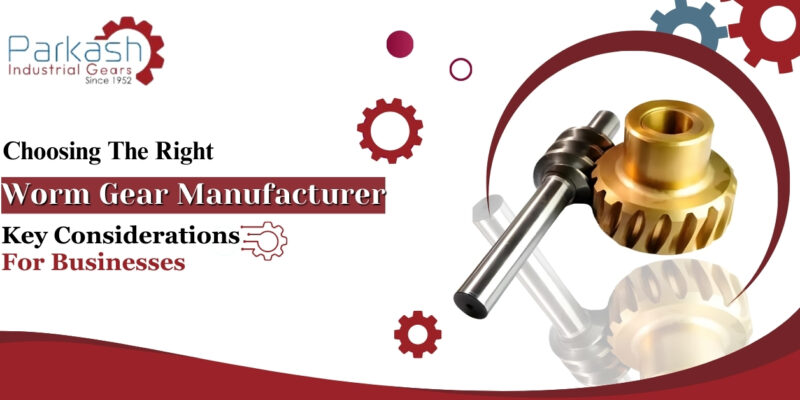
Choosing the Right Worm Gear Manufacturer: Key Considerations for Businesses
Essential Guide to Selecting the Best Worm Gear Manufacturer for Your Business
In the complex world of mechanical engineering, the importance of selecting the right components cannot be overstated. One such critical component is the worm gear. Used widely in applications that require large gear reductions and high torque, worm gears are indispensable in various industries, including automotive, aerospace, and industrial machinery. This article explores the essential considerations for businesses when choosing a worm gear manufacturer, highlighting the key aspects of worm gear manufacturing that ensure optimal performance and reliability.
Understanding Worm Gears
What Are Worm Gears?
Worm gears consist of a worm (a screw-like component) and a worm wheel (a gear that meshes with the worm). This setup provides significant speed reduction and torque multiplication. The unique design of gears allows for smooth and quiet operation, making them ideal for applications where noise reduction is crucial.
Advantages of Worm Gears
- High Reduction Ratios: Worm gears can achieve high reduction ratios with relatively small gears.
- Compact Design: They offer a compact solution for large torque transmission.
- Self-Locking Capability: Worm gears can be self-locking, providing safety in applications where reverse movement is undesirable.
The Role of Worm Gear Manufacturing
- Precision Engineering
Worm gear manufacturing requires precision engineering to ensure that the gears operate smoothly and efficiently. The manufacturing process involves meticulous attention to detail, from designing the gear profiles to selecting the appropriate materials. High-quality worm gears are typically made from durable materials such as hardened steel or bronze, ensuring longevity and reliability.
- Advanced Manufacturing Techniques
Modern worm gear manufacturing utilizes advanced techniques and machinery to achieve precise tolerances and high-quality finishes. CNC machining, gear hobbing, and grinding are common methods used to produce worm gears with the required accuracy. These techniques help in maintaining consistent quality across batches, which is crucial for applications that demand high reliability.
- Quality Control and Testing
Quality control is a critical aspect of worm gear manufacturing. Manufacturers implement rigorous testing protocols to ensure that each gear meets the required specifications. This includes dimensional inspections, material testing, and performance evaluations. Adherence to international standards, such as ISO, further ensures that the gears are of the highest quality.
Key Considerations for Choosing a Worm Gear Manufacturer
1. Experience and Expertise
When selecting a worm gear manufacturer, consider their experience and expertise in the field. Manufacturers with a long history in worm gear manufacturing are likely to have refined their processes and developed a deep understanding of gear design and performance. Look for manufacturers who have a proven track record of delivering high-quality gears for your specific industry.
2. Customization Capabilities
Every application has unique requirements, and a good worm gear manufacturer should offer customization options to meet these needs. Whether it’s adjusting the gear ratio, modifying the gear profile, or selecting specific materials, the ability to customize gears ensures that they are perfectly suited to your application. Discuss your requirements with potential manufacturers to gauge their flexibility and willingness to provide tailored solutions.
3. Technological Advancements
The best worm gear manufacturer invest in the latest technology to enhance their production capabilities. Advanced machinery and software tools allow for greater precision and efficiency in manufacturing. Additionally, manufacturers who stay abreast of technological advancements are better equipped to innovate and improve their gear designs, resulting in superior products.
4. Material Selection
The choice of materials is critical in worm gear manufacturing. High-quality materials enhance the durability and performance of the gears. Manufacturers should offer a range of material options, including hardened steel, bronze, and specialized alloys, to ensure that the gears can withstand the demands of your application. Evaluate the manufacturer’s material selection and their ability to provide expert advice on the best materials for your needs.
5. Quality Assurance
A reputable worm gear manufacturer should have a robust quality assurance program in place. This includes thorough inspections at every stage of the manufacturing process, from raw material selection to final product testing. ISO certification or other quality management certifications are good indicators of a manufacturer’s commitment to quality. Ensure that the manufacturer follows strict quality control measures to deliver reliable and high-performance gears.
6. Lead Times and Delivery
Timely delivery is crucial for maintaining the efficiency of your operations. Discuss lead times with potential manufacturers and assess their ability to meet your deadlines. A manufacturer with efficient production processes and a reliable supply chain can provide faster turnaround times, helping you avoid costly delays.
7. Technical Support and After-Sales Service
Technical support and after-sales service are important considerations when choosing a worm gear manufacturer. A manufacturer who offers comprehensive support can assist you with gear selection, installation, and troubleshooting. Additionally, after-sales service, including maintenance and repair, ensures that you can rely on the manufacturer for ongoing support, maximizing the lifespan and performance of your gears.
Industries Benefiting from High-Quality Worm Gear Manufacturing
- Automotive Industry – In the automotive industry, worm gears are used in steering mechanisms, transmission systems, and differential drives. High-quality worm gears enhance the performance and reliability of these critical components, contributing to the overall safety and efficiency of vehicles.
- Aerospace – Aerospace applications demand precision and reliability. Worm gears are used in actuators, landing gear systems, and control surfaces. The ability of worm gears to provide high torque in a compact design makes them ideal for aerospace applications where space and weight are critical considerations.
- Industrial Machinery – Worm gears are integral to various types of industrial machinery, including conveyors, elevators, and packaging equipment. The durability and efficiency of worm gears ensure that these machines operate smoothly and reliably, minimizing downtime and maintenance costs.
- Renewable Energy – In the renewable energy sector, worm gears are used in wind turbines and solar tracking systems. The high torque and self-locking capabilities of worm gears make them suitable for these applications, where precise and reliable gear operation is essential for maximizing energy production.
Conclusion
Choosing the right worm gear manufacturer is a critical decision that can significantly impact the performance and reliability of your machinery. By considering factors such as experience, customization capabilities, technological advancements, material selection, quality assurance, lead times, and technical support, businesses can identify manufacturers who can meet their specific needs and deliver high-quality gear.
Invest in the best gear manufacturer to gear your business for success. With Parkash Industrial Gears as your partner, you can achieve optimal performance, minimize downtime, and ensure the long-term reliability of your machinery.

 FSC India.
FSC India.
This Post Has 0 Comments